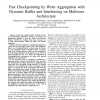Free Online Productivity Tools
i2Speak
i2Symbol
i2OCR
iTex2Img
iWeb2Print
iWeb2Shot
i2Type
iPdf2Split
iPdf2Merge
i2Bopomofo
i2Arabic
i2Style
i2Image
i2PDF
iLatex2Rtf
Sci2ools
140
Voted
HIPC
2009
Springer
2009
Springer
Fast checkpointing by Write Aggregation with Dynamic Buffer and Interleaving on multicore architecture
Large scale compute clusters continue to grow to ever-increasing proportions. However, as clusters and applications continue to grow, the Mean Time Between Failures (MTBF) has reduced from days to hours. As a result, fault tolerance within the cluster has become imperative. MPI, the de-facto standard for parallel programming, is widely used on such large clusters. Many MPI implementations use Checkpoint/Restart schemes using the Berkeley Lab Checkpoint Restart (BLCR) Library to achieve some level of fault tolerance. However, the performance of the Checkpoint/Restart mechanism does not scale well with increasing job size. As a result, the deployment of Checkpoint/Restart mechanisms for large scale parallel applications is compromised. In our previous work, we proposed a technique to aggregate certain categories of checkpoint writes to reduce the checkpointing overhead. However, an application still experiences slow checkpoint writing because it is blocked waiting for its checkpoint file...
Checkpoint Creation | Distributed And Parallel Computing | Fault Tolerance | HIPC 2009 | Large Scale |
| Added | 18 Feb 2011 |
| Updated | 18 Feb 2011 |
| Type | Journal |
| Year | 2009 |
| Where | HIPC |
| Authors | Xiangyong Ouyang, Karthik Gopalakrishnan, Tejus Gangadharappa, Dhabaleswar K. Panda |
Comments (0)

